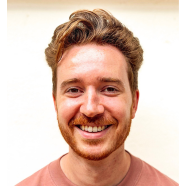
Joe graduated in Psychology and Neuroscience in 2011 and completed his MSc in Clinical Mental Health Sciences at University College London in 2016. He pursued his PhD in Cognitive Neuroscience at the Institute of Psychiatry, Psychology and Neuroscience at King’s College London where he studied the computational and psychopharmacological mechanisms that underpin beliefs and delusions during social interaction with Prof Mitul Mehta and Drs Michael Moutoussis, Quentin Deeley, and Vaughan Bell. In 2022 he relocated to Queensland Brain Institute to complete his postdoctoral training with Prof Peter Dayan and Prof Linda Richards, applying computational models of cognition, and building novel computational models of social interaction, to understand cognition in health and disorder. Joe has received several prestigious prizes in psychiatry, such as an Early Career Award from the Schizophrenia International Research Society (2021), and the Public Communication Award from the British Association of Psychopharmacology (2019). Joe has been supported in his scientific roles by funding from the Medical Research Council (UK), Australian Research Council (AU), and Wellcome Trust (UK).
Joe’s Social Computation and Cognitive Representation lab investigates the computational and cognitive basis of social interaction in health and disorder. Joe’s lab uses a combination of theoretical and experimental development to accomplish this. Theoretically, his lab develops novel computational models of social interaction. Experimentally, Joe combines basic computational neuroscience, psychopharmacological manipulations, and neuroimaging designs (e.g. fMRI) in general population and patient studies to gain a deeper understanding into the mechanisms that go awry psychiatric and neurological disorder. Using both aspects, Joe’s group translates mechanistic insights to a population scale. The ultimate goal of the lab is to build better formal theories of cognition to improve preventative and acute treatments of debilitating disorders. To integrate these goals with international efforts Joe’s lab is part of global networks that collate data and collaborate on projects, such as the International Consortium of Paranoia Research (ICPR) and the IRC5.